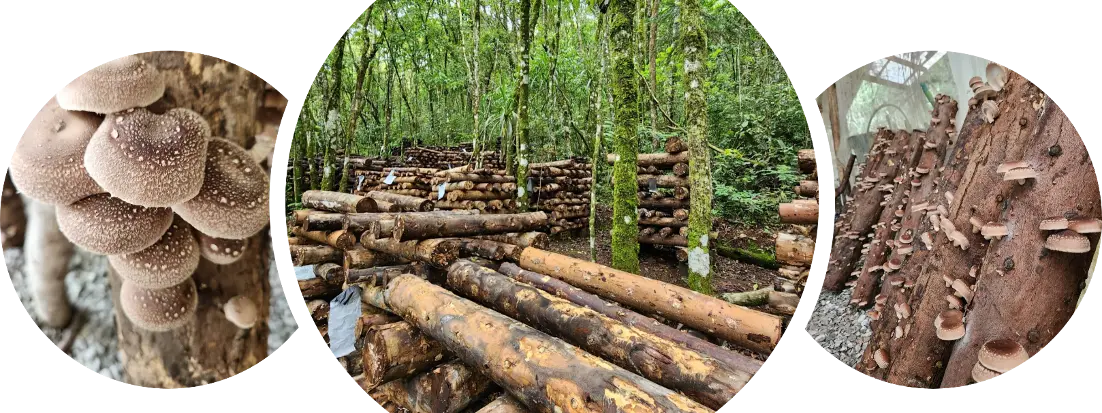By Beatrice Adoyo and Edith Anyango of CIFOR-ICRAF and Karina David and Talis Thale of Pro Nobis Agroflorestal
Enhancing farm diversification, synergy, resilience, culture and food tradition, are some of the elements of agroecology that are supported by the cultivation of mushrooms. In a recent, enlightening, journey into the world of shiitake mushroom cultivation, farmers from Pro Nobis Agroflorestal, Brazil, facilitated a workshop at Seed Savers Network in Elementaita, Kenya. The workshop not only covered the technical aspects of growing shiitake mushrooms but also emphasized their broader role in promoting agroecological integration for food security and ecological sustainability.
Shiitake mushrooms (Lentinula edodes), native to East Asia (Japan, China, and Korea), have been traditionally harvested for both culinary and medicinal uses. While historically consumed as a traditional food, the consumption of mushrooms is not popular in Kenya, particularly among local communities. However, shiitake mushroom production is regaining popularity due to its potential benefits as a source of livelihood, as well as its ecological, health and nutritional value. This mushroom variety grows best on hardwood logs and is easy to grow – owing to its adaptability to various climatic conditions and thereby making it ideal for small-holder farmers.
Shiitake mushroom cultivation on logs was presented as a contributor to agroecological transition, focusing on its ability to enhance farm diversification and resilience, as well as create a synergistic relationship within the fam ecosystem. Traditionally, the growth of shiitake mushrooms was enhanced by cutting hardwood logs and inoculating them with shiitake pores. However, the growing market demand has promoted more innovative approaches where shiitake pores are cultured into plugs, which are then inoculated into hardwood logs and incubated under humid conditions. This approach promotes large scale production on small space while creating employment and livelihood opportunities among households. One of the most valuable aspects of the workshop was the hands-on training session that guided farmers through the process of inoculating logs with shiitake plugs, a critical step in mushroom cultivation. This practical experience was invaluable in building farmers’ confidence to start their own shiitake cultivation.

Photo collage illustrating training sessions on shiitake mushroom cultivation. Credit: Beatrice Adoyo
The workshop emphasized the importance of agroforestry in shiitake mushroom cultivation, where inoculated logs can be grown alongside trees to enhance soil health and biodiversity. This integration fosters a more diversified agri-food system, improving farm resilience and contributing to sustainable agriculture and human well-being. Additionally, it diversifies farmers’ income streams by offering additional sources of revenue. Shiitake mushroom cultivation requires low inputs, with minimal chemical use, and provides a nutritious and safe food source. After harvesting, the decomposed logs are incorporated into the soil, further improving soil health through nutrient cycling. Despite the potential benefits of cultivating shiitake mushrooms, access to the mushroom plugs or spores poses a challenge for broader implementation. The absence of local production and supply facilities would necessitate importing these essential materials, leading to higher production costs. A collaborative effort between key research organizations involved in the production of shiitake mushroom spores/plugs was suggested as a potential solution to addressing this gap.
The farmer-led workshop demonstrated the potential for farmers to drive practical knowledge transfer among themselves, fostering confidence, ownership, and the effective implementation of innovative practices. The training workshop was promoted by the Intercontinental Network of Organic Farmers Organizations (INOFO) and Seed Savers Network (SSN), and was supported by the Transformative Partnership Platform on Agroecology (Agroecology TPP) through its Ambassador program. It was anchored on the belief that farmers are more inclined to adopt successful practices shared by their peers.
Karina David of Pro Nobis Agroflorestal is the Agroecology TPP Ambassador, working closely on finding synergies between mushroom cultivation and scaling up of agroecological approaches – something that the Agroecology TPP has long had an interest in.

